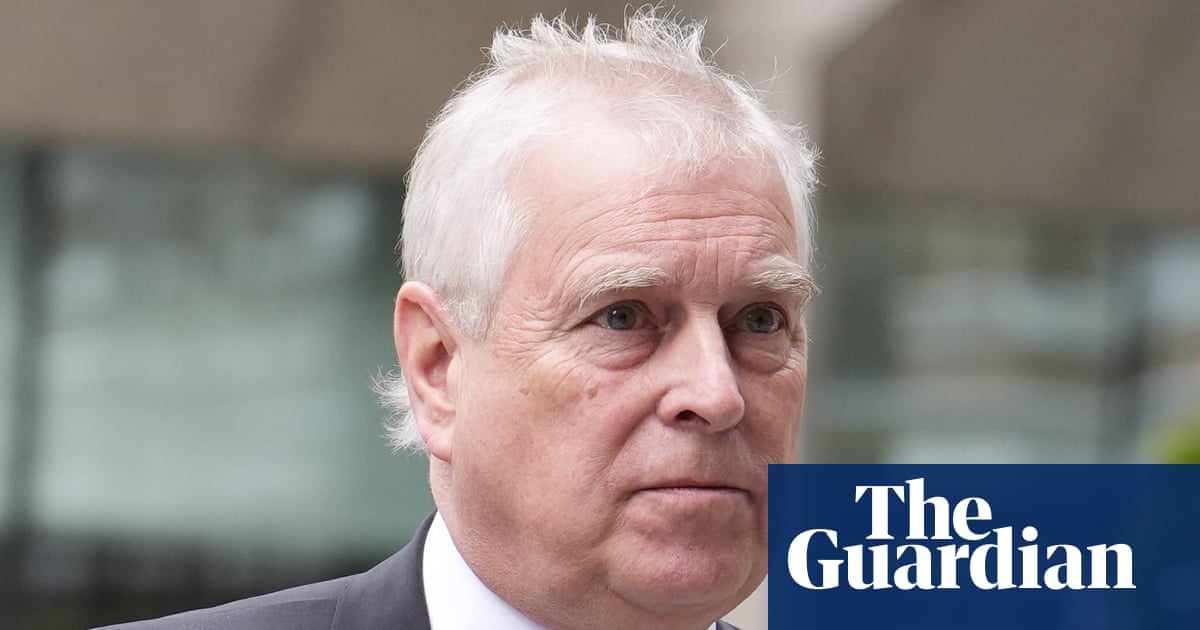Netanyhu begins speech at UN general assembly as scores of delegates walk out
Israeli prime minister Benjamin Netanyahu is now speaking at the UN general assembly in New York.
Before he started speaking, dozens of delegates in the hall walked out. There were boos and cheers.
As Netanyahu started talking about Iran, there was some shouting from the crowd. There has also been applause in reaction to Netanyahu’s comments about Israel’s war with Iran.
You can watch the speech live via the feed at the top of the page.
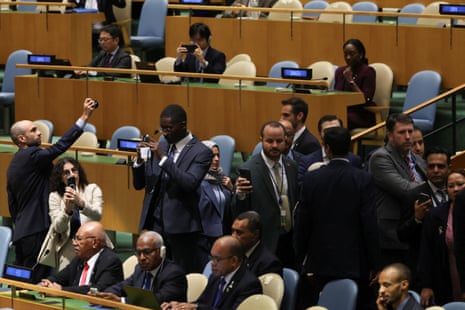
Key events Show key events only Please turn on JavaScript to use this feature
Netanyahu thanked US president Donald Trump for “his bold, decisive action against Iran”. The Israeli prime minister told the UN general assembly that “Iran’s enriched uranium stockpiles must be eliminated”.
He urged delegates to “remain clear-minded, vigilant [and] not allow Iran to rebuild [its] nuclear capabilities”.
Netanyhu added that Israel had “removed an existential threat of Iran” to his country.
Israeli prime minister Benjamin Netanyahu on Friday cataloged Israeli victories against Hamas militants, Iran and their supporters in a speech at the United Nations that reminded the world of Hamas’s actions on 7 October 2023.
He said Israel had “devastated” Iran’s atomic weapons and ballistic missiles programme. He said Israel had also “hammered” the Houthis, “crushed the bulk of Hamas” and “crippled” Hezbollah.
Netanyhu begins speech at UN general assembly as scores of delegates walk out
Israeli prime minister Benjamin Netanyahu is now speaking at the UN general assembly in New York.
Before he started speaking, dozens of delegates in the hall walked out. There were boos and cheers.
As Netanyahu started talking about Iran, there was some shouting from the crowd. There has also been applause in reaction to Netanyahu’s comments about Israel’s war with Iran.
You can watch the speech live via the feed at the top of the page.

Israeli prime minister Benjamin Netanyahu’s office has said that on his orders, troops will broadcast his speech at the UN headquarters to Palestinians in Gaza from loudspeakers mounted on trucks on the Israeli side of the border.
Benjamin Netanyahu to address the UN general assembly in New York
Israeli prime minister Benjamin Netanyahu will address the United Nations general assembly soon. He is expected to speak at 2pm BST (9am local time in New York).
Here are some images via the newswires of scenes in New York when Netanyahu arrived yesterday:

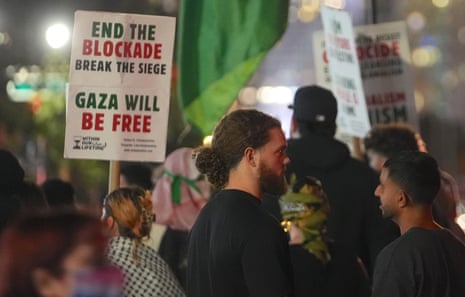
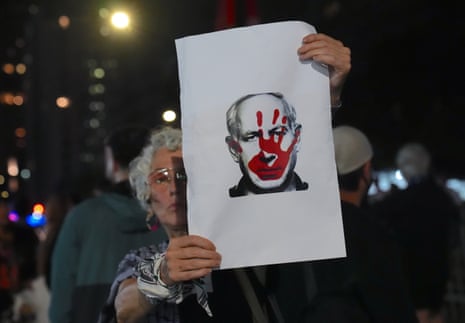
UN identifies 158 firms linked to Israeli settlements
The United Nations on Friday released a long-awaited update of its database of companies with activities in Israeli settlements, listing 158 firms from 11 countries, reports Agence France-Presse (AFP).
Big firms such as Airbnb, Booking.com, Motorola Solutions and Trip Advisor remained on the list, while several companies including Alstom and Opodo were removed, the non-exhaustive database showed, according to AFP.
Most of the companies were based in Israel, while others were based in Canada, China, France, Germany, Luxembourg, the Netherlands, Portugal, Spain, the UK and the United States.
The report called on companies to “take appropriate action to address the adverse human rights impacts” of their activities.
The UN high commissioner for human rights chief Volker Türk has condemned Israel’s policy of settlements on Palestinian territory in the occupied West Bank as a war crime. Türk said in a statement as his office published the database:
This report underscores the due diligence responsibility of businesses working in contexts of conflict to ensure their activities do not contribute to human rights abuses.
The list was first produced by the UN human rights office in 2020 amid harsh Israeli criticism, in response to a human rights council resolution four years earlier demanding a database of firms that profited from business in occupied Palestinian territory.
The UN rights office was asked to list companies found to be taking part in any of 10 specific activities, including construction, surveillance, demolitions and destruction of agricultural land in settlements in the West Bank, including East Jerusalem. It has stressed that listing companies in the database was “not, and does not purport to be, a judicial or quasi-judicial process”.
Despite a requirement for the database to be updated annually, it has been revised just once before, in 2023, when only the 112 firms that had figured on the original list were reviewed. Fifteen of them were removed for various reasons, leaving 97.
Friday’s release marks the first update that includes fresh names. The rights office said:
A total of 68 new companies were added to the list published in 2023, while seven of those … were removed as they were no longer involved in any of the activities concerned.
The exercise has been contentious from the start, reports AFP. In 2020 Israel and its main ally Washington fiercely condemned the creation of the database, with then Israeli foreign minister Israel Katz describing it as “a shameful surrender to pressure from countries and organisations who want to harm Israel”.
Palestinians, carrying their belongings by vehicle or on their backs, continue to flee toward southern Gaza via al-Rashid Street earlier today.


Philip Oltermann
The European Broadcasting Union has confirmed it will hold an online vote in November that could see the Israeli broadcaster Kan expelled from next year’s Eurovision song contest.
In a letter sent to participating broadcasters on Thursday, the EBU president, Delphine Ernotte Cunci, wrote there was an “unprecedented diversity of views” on Israel’s participation in Eurovision, and the issue required “a broader democratic basis”.
In a statement, the EBU said:
We can confirm that a letter has been sent from the executive board of the European Broadcasting Union to directors general of all our members informing them that a vote on participation in the Eurovision song contest 2026 will take place at an extraordinary meeting of the EBU’s general assembly to be held online in early November.
The decision comes after several European broadcasters, including those from Spain, the Netherlands, Ireland, Iceland and Slovenia, threatened to boycott the next edition of the world’s largest live music event if Israel was allowed to take part.
Russia was banned from Eurovision after its full-scale invasion of Ukraine in 2022. Meanwhile Israel, which has won the contest four times since its debut in 1973, has continued to compete for the past two years despite disputes over its participation.

Both the 2024 contest in Malmö, Sweden, and this year’s event in Basel, Switzerland, were marked by pro-Palestine protests around the concert halls.
Next year’s Eurovision, the 70th anniversary of the song contest, is due to be held in the Austrian capital, Vienna, in May.
Palestinians living in poverty were also affected, the Palestinian prime minister’s spokesperson Mohammad Abu al-Rob told Agence France-Presse (AFP), with their numbers rising by more than 150% since the start of the Gaza war, and with cash assistance not paid out in more than two months.
An increase in the number of Israeli checkpoints in the West Bank, and a reduction in work permits for West Bank Palestinians seeking work inside Israel have had a drastic impact.
The Palestinian economy is largely governed by the 1994 Paris protocol, which granted sole control over the territories’ borders to Israel, and with it the right to collect import duties and value-added tax for the Palestinian Authority.
Israel says that some of the money it withholds is meant to pay back costs such as electricity it sells to Palestinians. But finance minister Bezalel Smotrich, who stopped all payments to the authority four months ago, has said he would pursue the collapse of the Palestinian government through “economic strangulation” to prevent the creation of a Palestinian state.
The Palestinian Authority welcomed on Friday foreign fund pledges it said would help it keep government services going while Israel withholds tax revenues it collects on its behalf.
Donor countries including Saudi Arabia, Germany and Spain pledged at least $170m to finance the budget of the Ramallah-based Palestinian Authority, in New York on Thursday, according to Palestinian prime minister Mohammad Mustafa’s office.
The announcement came as world leaders gathered for the UN general assembly, with a recent string of recognitions of the state of Palestine by countries including France and the UK.
The authority had sought $400m a month for six months, and the prime minister’s spokesperson Mohammad Abu al-Rob told Agence France-Presse (AFP) it was unclear whether the pledged funds would be renewed.
The authority has long been in fiscal crisis, but its finances were further hit by the war in Gaza, with Israel withholding tax revenue meant for it.
In the West Bank, services provided by the authority have deteriorated in recent months, with Israel stopping tax revenue transfers amounting to 68% of the authority’s budget, according to Abu al-Rob. “Who can continue working while losing 60%? Which country can continue offering services?” he said.
Because of the cuts, schools in the West Bank opened late this year, and were still only opening three days a week, he added.
The cuts have also “reduced work to the lowest limit for emergency cases and operations”, while also hitting medicine stocks, he said.
Lammy says Gaza conflict is 'inhumane' and 'utterly unjustifiable' in address to UN general assembly
The UK’s deputy prime minister David Lammy has called the conflict in Gaza “inhumane” and “utterly unjustifiable”.
Addressing the United Nations general assembly in New York, Lammy said:
What is happening in Gaza is indefensible, it is inhumane, it is utterly unjustifiable and it must end now.
He said the UK had “proudly” recognised Palestine and said both its people and those of Israel “deserve better”. He said:
Better than the horrific acts by Hamas on 7 October that left children without their parents and parents without their children.
Better than the torment of families waiting desperately for the return of their loved ones from the most barbaric captivity. Better than the fanatical rule by Hamas, a vile, pitiless terrorist organisation that must have no future in Gaza.
Better than Israel’s denial of life-saving humanitarian aid and the catastrophic famine that it has caused.
As Israel escalates its military operations and displaces Palestinian families again and again and again, there can be no answer to these horrors but concerted diplomatic action to keep the hope of peace alive.
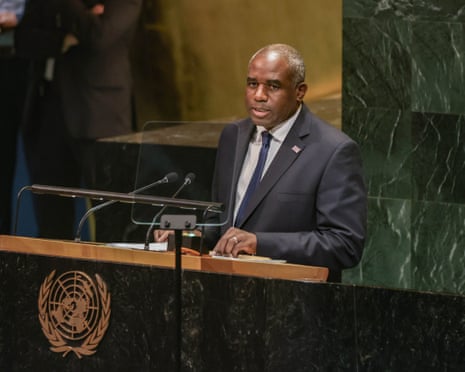
Earlier this week, the UK foreign secretary Yvette Cooper told the UN that recognising Palestinian statehood must be a “spur” to action rather than a “substitute” for it.
Cooper said the UK’s decision to recognise Palestine reflects the “grave reality” that the two-state solution is in “profound peril”.
Israel, which has imposed a naval blockade on Gaza, said the “Global Sumud Flotilla” will not pass and that the project will only assist Hamas.
The flotilla has blamed Israel for a drone attack it had said it experienced this week. According to Reuters, Israel’s foreign ministry did not respond directly to the accusation, but invited the flotilla to drop humanitarian aid for Israel to take to Gaza, or face consequences.
The exact timing of the flotilla’s departure from Greece is unclear. Organisers said on Friday that one of its lead boats had expeienced a mechanical failure but that it was still preparing to depart.

“We are not just delivering humanitarian aid. We are trying to deliver hope and solidarity, to send a strong message that the world stands with Palestine,” Swedish climate campaigner Greta Thunberg said from the deck of a boat off the Greek island of Crete on Thursday.
Italy had proposed a compromise whereby aid supplies could be dropped off in Cyprus and handed over to the Catholic church’s Latin Patriarchate of Jerusalem, which would then distribute it in Gaza. Israel said it backed the idea but the flotilla rejected it.
An international aid flotilla was expected to leave Greek waters and head towards Gaza on Friday, organisers said, defying warnings from Israel that it would use any means to block the boats’ access to the war-torn territory, reports Reuters.
The “Global Sumud Flotilla” is using about 50 civilian boats to try to break Israel’s naval blockade of Gaza, an initiative Israel strongly opposes. Many lawyers, parliamentarians, and activists, including Swedish climate campaigner Greta Thunberg, are on board.
Its passage across the Mediterranean has raised international tensions, especially after it said it was attacked by drones this week. No one was hurt, but Italy and Spain have dispatched naval ships to provide assistance to their and other European citizens on the flotilla.
Greece said it would guarantee the safe sailing of the flotilla off Greece, but Friday’s launch will take the flotilla back into international waters in the eastern Mediterranean.
Organisers said the boats aim to arrive early next week.
Civilian injuries in Gaza similar to those of soldiers in war zones, study finds

Jason Burke
Civilians in Gaza have sustained injuries of a type and on a scale more usually seen among professional soldiers involved in intense combat operations, research has found.
A study published in the British Medical Journal (BMJ) found that some types of wounds – such as burns or injuries to legs – were more common among civilians in Gaza than among US soldiers fighting in recent conflicts in Iraq and Afghanistan.
“Injured civilians in Gaza are experiencing a pattern of wounds that you would expect in intense combat with military professionals. The distribution and nature [of injuries] is almost the same or worse,” said Bilal Irfan, a bioethicist who conducts research at the University of Michigan and is one of the study’s authors.
The peer-reviewed research, the first of its kind, drew on data provided between August 2024 and February 2025 by dozens of international medical professionals who have worked in Gaza during the nearly two-year-old conflict.
Irfan said the data did not include most fatal injuries. “This is data for the patients who made it to hospital and so survived. We don’t even have a full profile of the serious injuries of those who died without any medical attention,” he said.

The new study will increase the pressure on Israel, which is facing deepening isolation over its conduct of the war in Gaza. Overall, almost 24,000 trauma-related injuries were reported in the study, of which 18% were burns. About two-thirds of injuries were from explosions.
Burns were particularly common and severe, in particular among children, the authors found. More than one-tenth of burn injuries were fourth-degree, meaning they penetrated all tissue layers down to the bone.
The extent of traumatic injury victims reflects “the impact of indiscriminate aerial and heavy explosive bombardment in civilian areas”, the study said.
Israel’s air force carried out airstrikes on Friday on eastern Lebanon, the Lebanese state-run news agency reported without giving any word on casualties. The Israeli military said it struck a site used for manufacturing precision missiles, reports the Associated Press (AP).
The airstrikes took place near the Lebanese village of Saraain in the Bekaa valley region, according to the National News Agency. They are the latest strikes since the 14-month Israel-Hezbollah war ended with a US-brokered ceasefire in November.
The Israeli military said the site constituted a violation of the understanding between Israel and Lebanon. It added that the military will continue to operate to remove any threat posed to Israel.
Since the ceasefire went into effect, Israel has carried out almost daily airstrikes on southern and eastern Lebanon, alleging that Hezbollah is trying to rebuild its capabilities.
Washington backing plan for Tony Blair to head transitional Gaza authority

Patrick Wintour
The White House is backing a plan that would see Tony Blair head a temporary administration of the Gaza Strip – initially without the direct involvement of the Palestinian Authority (PA), according to Israeli media reports.
Under the proposal, Blair would lead a body called the Gaza International Transitional Authority (Gita) that would have a mandate to be Gaza’s “supreme political and legal authority” for as long as five years.
According to reports in Haaretz and the Times of Israel, the plan is modelled on the administrations that initially oversaw Timor-Leste and Kosovo’s transitions to statehood. The proposal suggests that Gita could at first be based in el-Arish, an Egyptian provincial capital near Gaza’s southern border, and would eventually enter the territory accompanied by a UN-endorsed, largely Arab multinational force. The plan envisions “the eventual unifying of all the Palestinian territory under the PA”.
Under the plan, Palestinians would not be made to leave the territory, as had been feared would occur under previous US proposals to develop it as the “Gaza Riviera”.
If approved, Blair would head a secretariat of up to 25 people and chair a seven-person board to oversee an executive body running the territory.
But any role for the former Labour leader would inevitably prompt intense controversy. After stepping down as prime minister in 2007, he took on the role of Middle East envoy until 2015 and he enjoys a high standing with many Gulf leaders. But Blair is bitterly resented by many Palestinians – who see him as having impeded their efforts to attain statehood – and more broadly across the region for his role in backing the 2003 US invasion of Iraq.
Some western diplomats stressed it was by no means a done deal that Blair would run the interim Palestinian administration, and said it might be in place for only two years.
They added the Trump plan for the day after is linked to a ceasefire and full hostage deal.
News of the plan emerged just days after the UN general assembly endorsed a different plan for a technocratic administration to take charge in Gaza. Under that proposal, known as the New York declaration, the interim administration would operate for just one year, on the clear understanding that it would then hand power to a reformed PA with a revised constitution and after elections for a new president and parliament.
Trump says he ‘will not allow’ Israel to annex West Bank after lobbying from allies

Jason Burke
Donald Trump has said he will not allow Israel to annex the occupied West Bank, rejecting calls from some far-right politicians in Israel who want to extend sovereignty over the area and in doing so make impossible the establishment of a Palestinian state.
“I will not allow Israel to annex the West Bank. Nope, I will not allow it. It’s not going to happen,” Trump told reporters in the Oval Office, adding “There’s been enough. It’s time to stop now.”
Trump made the comments as Benjamin Netanyahu was arriving in New York to deliver an address to the United Nations on Friday.
There has been widespread speculation in Israel and elsewhere over how Netanyahu intends to retaliate for the recognition of Palestine as a state earlier this week by the UK, Australia, France, Canada and Portugal.
Officials in Jerusalem have said that anything Netanyahu does will be cleared first with Trump. Options include full annexation of the West Bank, or of smaller portions such as a strip of territory along the border with Jordan or shuttering British, French and other consulates in East Jerusalem, analysts said.
Earlier this week, British officials said they feared Trump would recognise Israeli control over illegal settlements on the West Bank in retaliation for the moves by the UK and others.
Netanyahu set for defiant UN speech as Trump warns on annexation of West Bank
Israeli prime minister Benjamin Netanyahu is expected to share a defiant message at the UN general assembly on Friday against a Palestinian state, but faces rare pressure from US president Donald Trump who seeks a deal on Gaza.
Netanyahu will address the UN days after France, the UK and several other western powers took the step of recognising a state of Palestine, acting out of exasperation over Israel’s relentless two-year offensive in Gaza.
The longest-serving prime minister in Israeli history has long rejected a Palestinian state and his far-right allies have mulled annexing the West Bank to kill any real prospect of an independent Palestine. But Trump, normally a staunch ally of Netanyahu, has warned against annexation as he pitches a peace plan on Gaza that would include the disarmament of Hamas.
“I will not allow Israel to annex the West Bank,” Trump told reporters at the White House. “No, I will not allow it. It’s not going to happen.”
Trump spoke on Thursday by telephone with Netanyahu, who is expected to head on Monday to Washington.
With Netanyahu facing an international criminal court arrest warrant over war crime allegations, including using starvation as a weapon, the Israeli prime minister took an unusual route to New York that included flying over the narrow strait of Gibraltar.
Steve Witkoff, Trump’s real-estate friend turned global negotiator, was seen entering the tightly guarded luxury hotel where Netanyahu was staying in Manhattan, reports Agence France-Presse (AFP). About 20 protesters and a similar number of Netanyahu supporters were spotted outside.
Activists have planned a march from Times Square on Friday that will call for Netanyahu’s arrest, to coincide with his speech. More on this in a moment, but first here are some other key developments:
-
The White House is backing a plan that would see Tony Blair head a temporary administration of the Gaza Strip – initially without the direct involvement of the Palestinian Authority (PA), according to Israeli media reports. Under the proposal, Blair would lead a body called the Gaza International Transitional Authority (Gita) that would have a mandate to be Gaza’s “supreme political and legal authority” for as long as five years.
-
Civilians in Gaza have sustained injuries of a type and on a scale more usually seen among professional soldiers involved in intense combat operations, research has found. A study published in the British Medical Journal (BMJ) found that some types of wounds – such as burns or injuries to legs – were more common among civilians in Gaza than among US soldiers fighting in recent conflicts in Iraq and Afghanistan.
-
The European Broadcasting Union has confirmed it will hold an online vote in November that could see the Israeli broadcaster Kan expelled from next year’s Eurovision song contest. In a letter sent to participating broadcasters on Thursday, the EBU president, Delphine Ernotte Cunci, wrote there was an “unprecedented diversity of views” on Israel’s participation in Eurovision, and the issue required “a broader democratic basis”.
-
Uefa could decide as early as next week whether to suspend Israel from its competitions, with the governing body facing growing pressure from inside and outside the game. Reports on Thursday, initially in the Times, suggested a vote that would determine Israel’s participation in World Cup qualifying and that of Maccabi Tel Aviv in the Europa League could be held by Uefa’s executive committee before the international break begins on 6 October.
-
A final Russian attempt to defer the snapback of large-scale UN sanctions on Iran is expected to fail at the UN security council on Friday after European countries rejected last-minute Iranian offers to give UN weapons inspectors limited access to its bombed nuclear sites.

 3 months ago
41
3 months ago
41



















